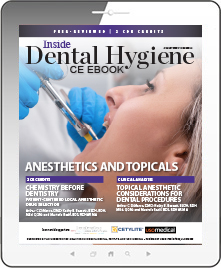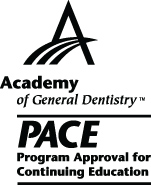CDEWorld > eBooks > Anesthetics and Topicals


ADA CERP is a service of the American Dental Association to assist dental professionals in identifying quality providers of continuing dental education. ADA CERP does not approve or endorse individual courses or instructors, nor does it imply acceptance of credit house by boards of dentistry. Concerns or complaints about a CE provider may be directed to the provider or to ADA CERP at www.ada.org/cerp/

Approved PACE Program Provider. FAGD/MAGD credit. Approval does not imply acceptance by a state or provincial board of dentistry, or AGD endorsement. 1/1/2023 to 12/31/2028. ID # 209722.
eBook
Released: Friday, August 26, 2022
Expires: Sunday, August 31, 2025
Anesthetics and Topicals
Commercial Supporters: DirectaDentalGroup, Cetylite, USO Medical
This Inside Dental Hygiene eBook features a continuing education (CE) article that compares and contrasts the five amide local anesthetic (LA) drugs most commonly used in dentistry. A second article explains current knowledge of the topical anesthetic agents available and their limitations and inherent risks. Download to earn 2 FREE CEU now!
FEATURED CONTENT
CE: Chemistry Before Dentistry: Patient-Centered Local Anesthetic Drug Selection
Arthur C.DiMarco, DMD; Kathy B. Bassett, BSDH, RDH, MEd, QOM; and Mustafa Radif, BDS, RDHAP, MA
Strategies for patient-centered dental pain management require current knowledge of the injectable LA medications used in dentistry. These drugs share common pharmacology characteristics which influence their effectiveness during clinical dental procedures. Safe and effective local anesthesia is determined by balancing patient variables with treatment requirements, medication limits, and possible risks. To give the most appropriate LA agent or agents, it is necessary to understand the distinctions between these drugs.
Credits: 2 Self-Study CEU
Cost: $0
Provider: Conexiant Education
Topical Anesthetic Considerations for Dental Procedures
Arthur C. DiMarco, DMD; Kathy B. Bassett, BSDH, RDH, MEd, QOM; and Mustafa Radif, BDS, RDHAP, MA
Topical anesthetics are widely used in medicine and dentistry. Despite this extensive use and well-deserved reputation for safety, not all topicals are equally safe and effective in certain preparations and applications. As questions arise regarding the safest use of topical products, dental clinicians should consider the risks and benefits for each patient while keeping in mind that more is not better and that topicals should be applied judiciously..
Download FREE eBook now!

